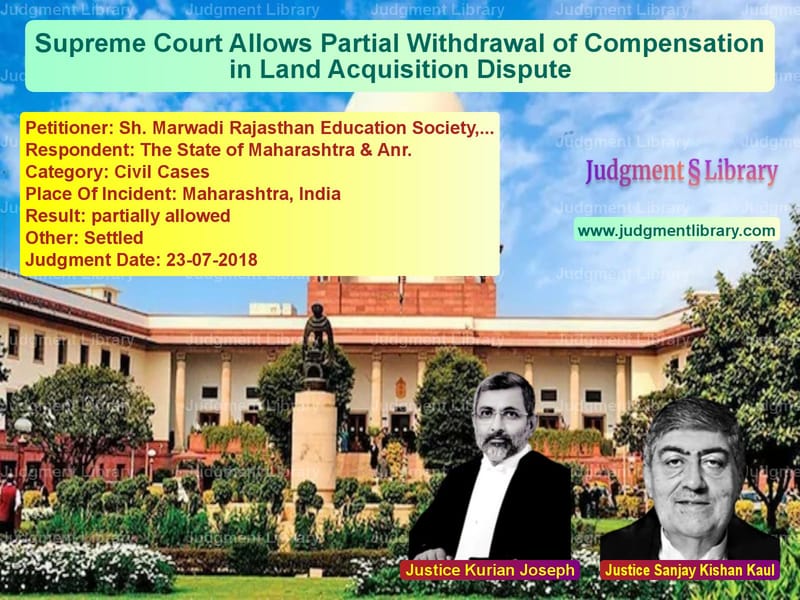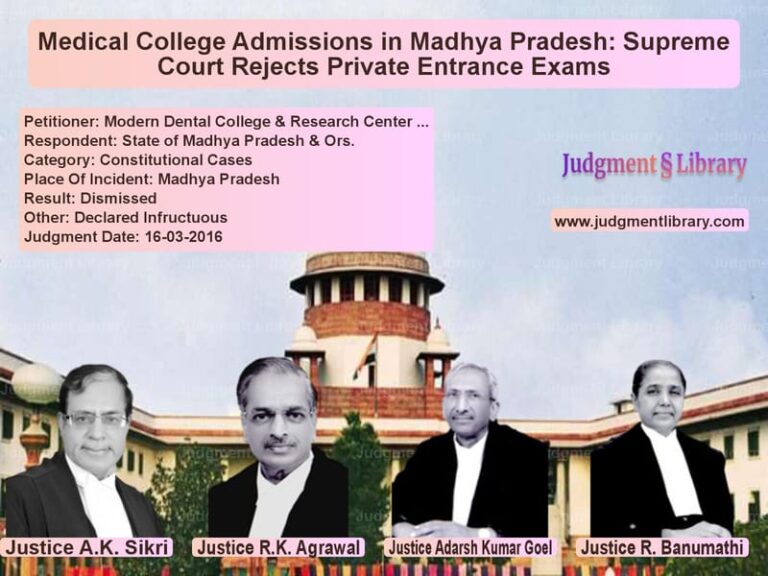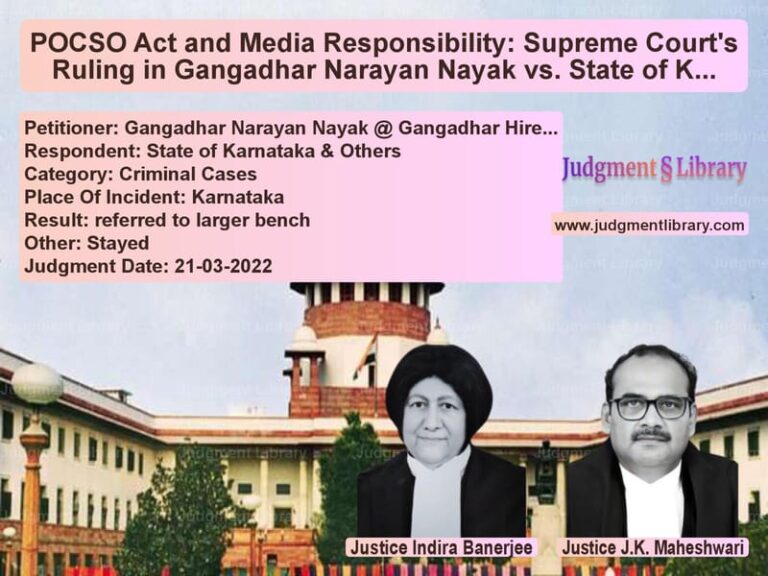Supreme Court Allows Partial Withdrawal of Compensation in Land Acquisition Dispute
The Supreme Court of India, in the case of Sh. Marwadi Rajasthan Education Society, Latur vs. The State of Maharashtra & Anr., delivered a significant judgment on the withdrawal of compensation in land acquisition cases. The case revolved around the appellant’s request to withdraw the compensation amount deposited in the Reference Court following the acquisition of their land by the government. The Court ruled that the appellant could withdraw 50% of the deposited amount without security, while the remaining amount could only be withdrawn upon furnishing appropriate security to the satisfaction of the Reference Court.
Background of the Case
The land in question belonged to the appellant, Sh. Marwadi Rajasthan Education Society, Latur, which was acquired by the government for public purposes. Compensation was awarded for the acquisition, and the amount was deposited in the Reference Court. However, the appellant sought to withdraw the compensation amount immediately, citing financial hardship and the need to sustain the institution’s operations. The respondents, including the State of Maharashtra, opposed the withdrawal without sufficient security, arguing that the amount should only be released following the final determination of claims.
Key Legal Issues Considered
- Whether the appellant had the right to withdraw the entire compensation amount before the final adjudication.
- The necessity of requiring security for withdrawing compensation.
- The role of the Reference Court in managing and overseeing compensation disbursement.
- The balance between ensuring rightful claimants receive their dues and preventing misuse of compensation funds.
Arguments Presented
Arguments by the Appellant (Sh. Marwadi Rajasthan Education Society, Latur)
- The appellant contended that, since the land had already been acquired, they were entitled to withdraw the compensation without restrictions.
- The institution was facing financial difficulties due to the land acquisition, and delays in compensation withdrawal would impact its operations.
- There was no legal or procedural impediment to withdrawing the deposited amount.
- The appellant also argued that requiring security for withdrawal placed an undue burden on them, as they had already suffered financial loss due to the land acquisition.
Arguments by the Respondents (State of Maharashtra & Anr.)
- The State argued that allowing complete withdrawal without security could lead to complications if there were later disputes regarding the compensation amount.
- Security was essential to ensure the compensation was properly allocated and to prevent possible misuse.
- Judicial supervision was necessary to safeguard public funds and ensure compliance with legal requirements.
- The respondents maintained that the Reference Court should exercise discretion in allowing withdrawals to protect both the claimants and the integrity of the compensation process.
Supreme Court’s Observations
The Supreme Court carefully examined the matter, considering both the financial needs of the appellant and the necessity of maintaining safeguards in compensation disbursement. The Court ruled that a balanced approach was required, permitting partial withdrawal without security while ensuring security for the remaining amount:
“The appellant seeks to withdraw the compensation amount deposited in the Reference Court. We permit the appellant to withdraw 50% of the amount deposited without any security. The remaining amount can be withdrawn on furnishing appropriate security to the satisfaction of the Reference Court.”
The Court clarified that this order applies to both past and future deposits, ensuring consistency in its application.
Final Judgment
The Supreme Court ruled as follows:
- The appellant is permitted to withdraw 50% of the compensation amount without furnishing security.
- The remaining amount may be withdrawn upon furnishing appropriate security to the satisfaction of the Reference Court.
- The order applies to both previously deposited and future deposited amounts.
- The appeal was disposed of accordingly.
Impact of the Judgment
This ruling has significant implications for land acquisition disputes and compensation disbursement. It:
- Provides relief to landowners and institutions seeking immediate access to compensation funds.
- Establishes a legal precedent for allowing partial withdrawal while maintaining necessary safeguards.
- Ensures judicial oversight in the disbursement process to prevent misuse or misallocation of compensation funds.
- Balances the interests of both the claimants and the state by allowing partial withdrawal without security while requiring safeguards for the remaining amount.
Analysis of the Court’s Reasoning
The Supreme Court’s decision reflects a pragmatic approach to handling land acquisition compensation cases. While recognizing the appellant’s need for immediate funds, the Court also acknowledged the necessity of safeguarding public funds and preventing unwarranted withdrawals. The requirement of security for the remaining amount ensures that the funds are available for legitimate claimants while allowing the appellant to access a portion of the compensation without unnecessary delay.
Legal Precedents Considered
The Court referred to previous rulings where compensation disbursement was subject to similar conditions. In cases involving land acquisition, courts have consistently held that while claimants have a right to compensation, procedural safeguards must be observed to maintain fairness in the process. The judgment aligns with past decisions ensuring that compensation is disbursed equitably and efficiently.
Practical Implications
For landowners and institutions involved in land acquisition cases, this ruling provides clarity on how compensation withdrawals should be handled. It establishes that:
- Claimants can seek immediate withdrawal of a portion of their compensation without security.
- Security may be required for withdrawing the remaining amount, ensuring accountability.
- Reference Courts play a crucial role in overseeing the disbursement process to prevent legal complications.
Conclusion
The Supreme Court’s decision in Sh. Marwadi Rajasthan Education Society, Latur vs. The State of Maharashtra & Anr. strikes a balance between the rights of landowners and the need for regulatory safeguards in compensation disbursement. By allowing partial withdrawal without security and requiring security for the remaining amount, the Court ensures both fairness and accountability in the process. The ruling sets a precedent for future land acquisition disputes, providing clarity and legal certainty for both claimants and government authorities.
Petitioner Name: Sh. Marwadi Rajasthan Education Society, Latur.Respondent Name: The State of Maharashtra & Anr..Judgment By: Justice Kurian Joseph, Justice Sanjay Kishan Kaul.Place Of Incident: Maharashtra, India.Judgment Date: 23-07-2018.
Don’t miss out on the full details! Download the complete judgment in PDF format below and gain valuable insights instantly!
Download Judgment: Sh. Marwadi Rajastha vs The State of Maharas Supreme Court of India Judgment Dated 23-07-2018.pdf
Direct Downlaod Judgment: Direct downlaod this Judgment
See all petitions in Property Disputes
See all petitions in Judgment by Kurian Joseph
See all petitions in Judgment by Sanjay Kishan Kaul
See all petitions in partially allowed
See all petitions in settled
See all petitions in supreme court of India judgments July 2018
See all petitions in 2018 judgments
See all posts in Civil Cases Category
See all allowed petitions in Civil Cases Category
See all Dismissed petitions in Civil Cases Category
See all partially allowed petitions in Civil Cases Category







